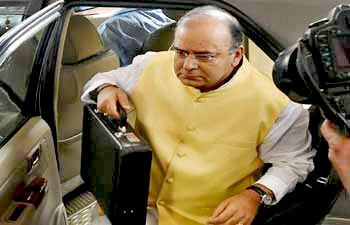New Delhi, Feb 28: Prime Minister Narendra Modi's stomach for free-market economics faces a major test on Saturday when the first full Budget will be unveiled by Finance Minister Arun Jaitely.
 Reaping the benefits of low global prices for oil, India's main import, Modi's government sees itself in a sweet spot with spare cash to modernize ageing roads and railways without busting fiscal deficit and inflation targets.
Reaping the benefits of low global prices for oil, India's main import, Modi's government sees itself in a sweet spot with spare cash to modernize ageing roads and railways without busting fiscal deficit and inflation targets.
"Let us stop unnecessary expenditure so that money can reach the poor," Modi told Parliament on Friday after the Economic Survey report committed to bringing the fiscal deficit down to 3 per cent of gross domestic product - from more than 4 per cent at present - in the medium-term. "We believe in optimum utilisation of our infrastructure," he said.
An overhaul of economic data has propelled India to the top of the league of fast-growing major economies, and the current account deficit is projected to fall below 1 per cent in 2016, which would help stabilize the rupee and build up reserves.
But expectations for a further shift in expenditure from subsidies to infrastructure are sky high among investors who made India the best performing stock market in Asia after China last year on hopes Modi's government brings sweeping reforms to labour, tax and land laws.
The rally has continued in 2015 on expectations that legislative reform will push ahead stalled private investment and consumer demand, and reverse a decline in corporate earnings to make Asia's third-largest economy a global growth driver.
The Budget being hyped as a 'make or break' exercise, is widely expected to unveil sops for tax payers while pushing forward the 'Make In India' campaign. Coming as it does after the Delhi electoral defeat and the Assembly elections scheduled in Bihar later in 2015, speculation is on whether the Budget will be populist. There is expectation that the Finance Minister could raise tax slabs or hike investment limit in saving instruments.
He is also likely to pursue the path of fiscal consolidation and keep the fiscal deficit target at 3.6 per cent of GDP, down from 4.1 per cent expected in 2015. Besides sops to individual tax payers, he is also expected to unveil initiatives to boost investments by corporates and promote manufacturing as part of the 'Make In India' campaign that aims to make the country a global manufacturing hub and create jobs.
The Economic Survey released on Friday underlined the need for 'Big Bang' reforms to boost growth to 8-10 per cent in the coming years. Besides , it has pitched for raising public investments to drive economic growth and improving business environment by making regulation and taxes less onerous.
Jaitley, who in his maiden Budget in July 2014 had outlined his approach to providing relief to individual tax payers, is expected to continue this in the BJP government's first full year Budget on Saturday. in 2014, he had raised the personal income tax exemption limit by Rs 50,000 to Rs 2.50 lakh and also raised by same amount the exemption from payment of I-T on savings to Rs 1.50 lakh.
However, this time around Jaitley, according to experts, may choose only one of them as he looks at additional revenue to boost public spending and push economy to high growth path. He may also look to raise the tax exempted investment limit in health insurance as well as exempt savings in pension schemes at all three stages -- entry, accrual and withdrawal.
Analysts warn that Indian stocks are overvalued and that equity markets could see a sell off of 6-8 per cent if the pro-growth measures in the budget fall short of expectations. Modi has capitalised on low oil prices to shake off some of the fuel subsidies that have hobbled India's national accounts for years. But he has been unable to pass reform in the upper house of Parliament, where the Bharatiya Janata Party-led government has no majority.





Comments
Add new comment